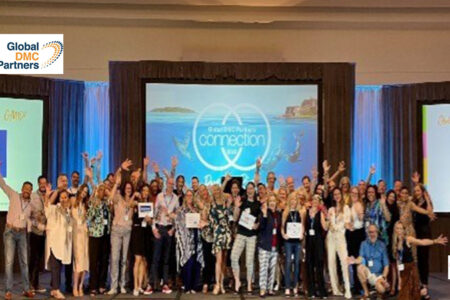Global DMC Partners, the world’s premier centralized resource for in-person, hybrid, and virtual events, has successfully concluded its eighth annual Connection, its first in-person event following the global pandemic. More than 160 attendees, including 65 meeting planners, gathered April 7 to 10, at the El Conquistador Resort in Puerto Rico to discuss the state of the rebounding meetings, events and travel industry.
“We were thrilled to finally be able to return to an in-person event this year,” says Global DMC Partners President and CEO Catherine Chaulet. “After much anticipation, our clients and DMC partners savored the time they had together to catch up, learn and network. Our goal was to create an open and approachable setting for attendees to make connections and share best practices across all levels, and we achieved that mission and so much more. Our industry is eager and ready to deliver terrific programs worldwide.”
Chaulet continued, “Having been virtual since 2020, we have a new appreciation for the importance of meeting face-to-face, and being able to host our annual event on the beautiful island of Puerto Rico made it that much more special.”
Chaulet kicked off the event with a keynote address, “Global Trends and Their Influence on the Meetings Industry.” She highlighted how global issues like COVID-19, inflation, pollution, “the Great Resignation” and others have impacted the meetings and travel industry and how event and travel professionals can achieve success amidst these changes. Key highlights of Chaulet’s address are outlined below:
The Future is Face to Face: Meetings and events are essential to long-term productivity for organizations. Despite global crises, such as COVID-19 and the Ukraine invasion, there are numerous indicators—such as an increased number of confirmed in-person events and conferences—demonstrating that the demand for travel and meeting face-to-face is once again on the rise.
Jobs: The COVID-19 pandemic took a significant toll on communities across the world and had a devastating effect on travel and tourism. In 2020, 62 million travel jobs were lost, representing a drop of 18.5 percent, leaving just 272 million employed across the sector globally, compared to 334 million in 2019. One contributing factor to rising staff shortages is that many furloughed or laid-off travel, tourism, hospitality and events employees moved to other sectors or out of the labor force entirely. To attain and retain talent, organizations must implement and sustain policies that facilitate labor mobility, enable remote work, provide social safety nets, upskill and reskill the workforce and promote education and individual and social well-being.
Sustainability & Tourism Impact: Around the world, in countries at all development levels, many millions of jobs and businesses are dependent on a strong and thriving tourism sector. Tourism has also been a driving force in protecting natural and cultural heritage, preserving them for future generations to enjoy. As the industry restarts and recovers from the global pandemic, meeting planners have a key role to play in relaunching tourism and supporting economies, natural resources and equality.
Budgets: The impact of inflation on the industry is significant due to shortages in labor and raw materials, rising freight costs, higher labor costs, increased insurance and health and safety related costs. As a result, costs for incentives, meetings and events have all increased leaving very little room for negotiations around them.
Meeting trends: Last-minute requests, low availability, shortages, high rates and new technology such as the Metaverse present both challenges and opportunities for event professionals to embrace.
Following Chaulet’s keynote presentation, an Industry Expert Panel addressed specific challenges in today’s ever-evolving environment such as staffing, availability, lead time, sustainability, diversity and inclusion, health and well-being, event technology and work-life balance.
Panelists included:
Tori Anthony, LPL Financial
Leigh Butterfield, 2B UK
Venetia Campbell, Independent Planner
Sean Hoff, Moniker
Katherine Kirk, Chicago Is…LLC
Stacy Lucherini, ALHI
Rae Malcham, BW Events Tech
Eloisa Urrutia, American Express Global Business Travel
Staffing
Staffing was cited as the greatest challenge amongst nearly all the panelists, who represented a wide range of industry categories and geographic regions. Sean Hoff of Moniker noted that his company has had success taking a more proactive approach in recruitment. Rather than simply posting job opportunities to hiring websites, the company has created behind-the-scenes, “a day in the life of…” video content for its social media channels. This strategy has helped the company not only achieve its recruitment goals but also set expectations for candidates and reduce on-the-job learning curves with regards to company culture.
Also Read: Social Media Monitoring: Meaning, Importance, Functioning, and Pricing
Venetia Campbell, who worked for a multi-level marketing company, spoke to the dramatic shift in how roles are now structured within her team. During the pandemic, this network-marketing company transitioned from seeking “planners” to “producers,” actively recruiting candidates who are tech-savvy and familiar with video or TV production and show-calling. Since then, positions have become more function-based, rather than generalist, utilizing employees’ specific talents and skillsets to produce virtual, hybrid and in-person events.
From her perspective within the technology side of the industry, Rae Malcham of BW Events Tech shared that prior to the pandemic, event technologists were not given a ‘seat at the table.’ However, due to the radical shift toward virtual and hybrid meetings, technologists are now a part of every planning decision, and she expects the industry to stay this way.
Technology
In addition to weighing in on the staffing conversation, Campbell also made note that her company has made an early commitment to engaging with its clients in the Metaverse. This was a direct result of her division’s success in pivoting to virtual events during the pandemic.

